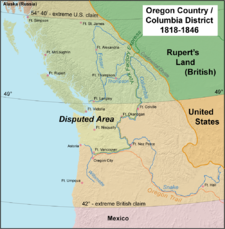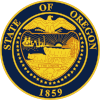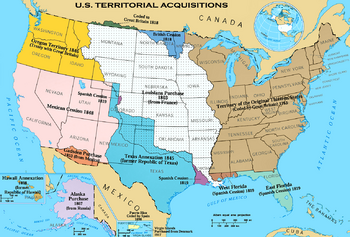Oregon Treaty

The Oregon Treaty,[1] is a treaty between the United Kingdom of Great Britain and Ireland and the United States that was signed on June 15, 1846, in Washington, D.C. The treaty brought an end to the Oregon boundary dispute by settling competing American and British claims to the Oregon Country, which had been jointly occupied by both Britain and the U.S. since the Treaty of 1818.
Contents |
Background
The Treaty of 1818 set the boundary between the United States and British North America along the 49th parallel of north latitude from Minnesota to the "Stony Mountains"[2] (now known as the Rocky Mountains). West of those mountains was known to the Americans as the Oregon Country and to the British as the Columbia Department or Columbia District of the Hudson's Bay Company. (Also included in the region was the southern portion of another fur district, New Caledonia.) The treaty provided for joint control of that land for ten years. Both countries could claim land and both were guaranteed free navigation throughout.
Joint control steadily grew less tolerable for both sides. After a British minister rejected U.S. President James K. Polk's offer to settle the boundary at the 49th parallel north, Democratic expansionists called for the annexation of the entire region up to 54°40′, the southern limit of Russian America as established by parallel treaties between the Russian Empire and the US (1824) and Britain (1825). However, after the outbreak of the Mexican-American War diverted U.S. attention and resources, a compromise was reached.
Negotiations
The treaty was negotiated by U.S. Secretary of State James Buchanan, who later became president, and Richard Pakenham, British envoy to the United States and member of the Privy Council of the United Kingdom for Queen Victoria. The treaty was signed on June 15, 1846.
The Oregon Treaty set the U.S. and British North American border at the 49th parallel with the exception of Vancouver Island, which was retained in its entirety by the British. Vancouver Island, with all coastal islands, was constituted as the Colony of Vancouver Island in 1849. The U.S. portion of the region was organized as Oregon Territory on August 14, 1848, with Washington Territory being formed from it in 1853. The British portion remained unorganized until 1858 when the Colony of British Columbia was declared as a result of the Fraser Canyon Gold Rush and fears of re-asserted American expansionist intentions. The two British colonies were amalgamated in 1866 as the United Colonies of Vancouver Island and British Columbia. When the Colony of British Columbia joined Canada in 1871, the 49th Parallel and marine boundaries established by the Oregon Treaty became the U.S.-Canadian border.
Treaty definitions
The treaty defined the border in the Strait of Juan de Fuca through the major channel. Unfortunately, the "major channel" was not defined, giving rise to further disputes in the archipelago there. Other provisions included:
- Navigation of "channel[s] and straits, south of the forty-ninth parallel of north latitude, remain free and open to both parties."
- The "Puget's Sound Agricultural Company" (a subsidiary of the Hudson's Bay Company) retains the right to their property north of the Columbia River, and shall be compensated for properties surrendered if required by the United States.
- The property rights of the Hudson's Bay Company and all British subjects south of the new boundary will be respected.[3]
Aftermath
In 1859, an unclear description of the maritime border in the treaty led to the bloodless war known as the Pig War over the ownership of the San Juan Islands.
See also
- James K. Polk
- Oregon Mission
- Joseph Smith Harris' account of surveying the border
References and footnotes
- ↑ officially titled the Treaty between Her Majesty and the United States of America, for the Settlement of the Oregon Boundary and styled in the United States as the Treaty with Great Britain, in Regard to Limits Westward of the Rocky Mountains, and also known as the Buchanan-Pakenham (or Packenham) Treaty or (sharing the name with several other unrelated treaties) the Treaty of Washington
- ↑ LexUM (2000). "Convention of Commerce between His Majesty and the United States of America.—Signed at London, 20th October 1818". Canado-American Treaties. Université de Montréal. http://www.lexum.umontreal.ca/ca_us/en/cus.1818.15.en.html. Retrieved 2006-03-27.
- ↑ LexUM (1999). "Treaty between Her Majesty and the United States of America, for the Settlement of the Oregon Boundary". Canado-American Treaties. Université de Montréal. http://www.lexum.umontreal.ca/ca_us/en/cus.1846.28.en.html. Retrieved 2007-01-12.
|
||||||||||||||||||||||
|
|||||||||||||||||||
|
|||||||

